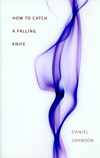How to Catch a Falling Knife
The greatest strength in How to Catch a Falling Knife, Daniel Johnson’s first collection of poems, is its chosen silences. While that may sound like strange praise, this book’s sparseness gives it a paradoxical power where the poet’s ability to know what not to say and when allows what he does say to starkly shine in the same way that it is more arresting to see one light left on in a house you gaze at from the dark street than it is when all the windows are festively blazing.
The greatest strength in How to Catch a Falling Knife, Daniel Johnson’s first collection of poems, is its chosen silences. While that may sound like strange praise, this book’s sparseness gives it a paradoxical power where the poet’s ability to know what not to say and when allows what he does say to starkly shine in the same way that it is more arresting to see one light left on in a house you gaze at from the dark street than it is when all the windows are festively blazing.
Johnson’s best poems combine his talent for leaving things out and a judicious use of repetition to give us a powerful tension; for example, as in “Do Unto Others” where he gives his readers just enough insight into the situation described to make our own narrative leaps while he catalogs and then repeats a list of rocks with which he would build a cairn over his brother. Occasionally Johnson missteps with a departure into too much description (in “Miniature,” for example, he gives us an exhaustive list of action and scenery that never really pays off), but, overall, this is a consistently powerful collection.
Johnson rarely has patience for unnecessary words or moments. In “My Father, The Small Town Sadist,” one of the book’s strongest poems, the title enjambs down into the first stanza of “is whistling his way to the dump. / A tin pail of teeth hangs / from the handlebars of his bike.” That Johnson never bothers to fully explain his father’s profession (dentist) or the undercurrents and tensions of family life (multiple) in the poem as it unfolds allows us to experience along with the speaker the last stanza’s sudden unsettling shift when “I clap and laugh with my mouth / open wide and my head thrown back / till something in the room turns.” Similarly the gaps of what Johnson leaves unsaid when he writes
I struck a match and left.
It’s how I go
A song on the radio.
A water tower in silhouette. (“Flight”)
and the effect he creates through weaving together sound and associative imagery rather than by walking us step by step down the path of unrelentingly explained meaning creates an ominous music that lingers long after the short poem has ended.





